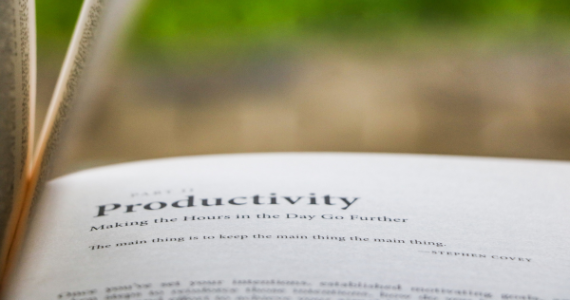Accountant and efficiency coach Liz Fleming helps business leaders make the most of their time to maximise their business productivity and success. She joined editor Cec Busby on the Flying Solo podcast to share a few top productivity hacks that help build a more efficient small business.
Liz Fleming hates wasting time. Known as The Efficiency Coach, she has dedicated her professional life to understanding the financial intricacies of running a business. This has helped her identify many ways business leaders can maximise their precious time.
“I love working with business owners and individuals to help them become as efficient as possible and make the most of their time,” says Liz. “As a business owner, it’s essential to identify where you want to put your focus, what your goals are, and the best ways to get there – and then look at where you’re wasting your time.”

Six ways to maximise your time and productivity
“Developing these efficiencies frees up your time to think about the growth of your business and to have big ideas,” says Liz, “because you’re not so stuck in the trenches of the business.”
1. Get the help you need
“The biggest place people waste their time is trying to do things that they don’t have any knowledge of,” Liz reveals. “Knowing when to hire or outsource work is important, so we can focus on what we do best in our business. It’s where many small and micro businesses go wrong; they don’t outsource early enough to create those efficiencies from the beginning.
“Bookkeeping is a classic example and one of the most important things that get overlooked, so it should be at the top of the list to outsource. You might spend two hours on bookkeeping a week, but if you spend another ten hours procrastinating, worrying, or being frustrated about it – outsourcing eliminates all that angst.”
Liz also stresses the importance of putting the proper accounting and invoicing systems in place from the very start to ensure your productivity keeps up with your growth.
“I’m a big believer of starting with those foundations from the very beginning, no matter how small you are, so that when you grow, you’re not having to grow your systems at the same time as growing your business.”
Listen to Liz Fleming on the Flying Solo podcast:
Do you hate wasting time? It’s time to learn a thing or two about
2. Condense your calendar
“It saves a lot of time to have one source of truth for your calendar, so you’re not looking at four different places to work out your schedule,” Liz advises. “That might be an Outlook diary that you can share with your team members, or your clients can book in. Some people love using their phones, and some like their paper diaries.
“Whatever that diary is, it has to work for you – just knowing where it is will save you and your business time.”
3. To-do list
“I encourage people to write down a to-do list and plan out the next day so you can relax in the evening,” Liz urges. “As small business owners, it’s tough to go to bed and not lie there, worrying about specific stuff. Research shows that if you write down your to-do list the night before, you can forget about it.
“Many business owners have a to-do list a mile long, which can cause overwhelm. Try creating a master to-do list, then pick out three major things that need to be done and three smaller tasks. That’s your priority list. Anything above that for the day becomes a bonus.
“Crossing tasks off the list can be very powerful because action-taking motivates you to do more. Use the to-do list to cross off your task and enjoy that sense of achievement, then move on to the next thing.”
4. Know the best ways for you to work
“Often, becoming more efficient comes down to how, when and where you work,” Liz advises. “If I’ve got to do some brainstorming, I like to go to a different space to get those creative juices flowing – I might go to a cafe or park, or just a different room.
“Just as important to know is when you are at your most productive. Is that first thing in the morning, later in the day, or evening? And also, what do you need to do to become productive? Is it meditating, eating breakfast, or going for a walk or to the gym? Once you’ve done your morning routine, you can get into work.”
“It’s also essential to understand how you work. Many people say you should do the hardest thing first, but that doesn’t work for me,” Liz admits. “I prefer to do a few quick wins, like sending an invoice or a couple of emails, and then get onto the hard thing. Then I can completely focus and not worry about the other stuff. That’s just me, but I know many people prefer to work on the hard thing first. This comes back to knowing your ideal way of working.
“It’s so important to understand how you learn and work best. That leads to greater productivity and ultimately, greater efficiency.”
5. Nix procrastination
“A good small business example of procrastination is putting off invoicing,” says Liz. “If you don’t send out an invoice, you don’t get that cash flow, so you can’t do the rest of your business.
“We need to get into the habit of sending an invoice two days after a job. Then it just becomes normal, and you’ve got less to do at the end of the month, so it’s not so daunting. Allocate 20 minutes each day or week, so your cash flow is coming in, which is what we all need. Cash is king for small business – we can never forget that.”
6. Revise your business plan
“People dread business planning, but it’s one of the most important things for a successful business. With my mentoring clients, we review a couple of critical points from their business plan each month, so by the end of the year, it becomes a living document.
“To evaluate what we’re currently doing in our business, we need to keep it updated. If things have changed, we’ve stopped doing something or created something new; we update the business plan. We need something to track against when reviewing our financials, progress and performance – if it’s out of date, there’s no point.
“Reviewing your business plan is the key to good decision-making and productivity. Ask yourself, was that the right decision? What process did we go through, and how has that impacted our business to aid us in future decisions?
“A business plan can be as simple as one or two pages,” reminds Liz. “You have to have something that you can track against. At the end of the time period, you can be proud of what you have achieved. It’s really important to reflect and celebrate those wins as well.”
Liz goes into lots more detail on each of these points in this informative interview, so be sure to listen to the full podcast episode for all the handy tidbits!
Source: Flying Solo June 2022
This article by SUZE ENGLISH is reproduced with the permission of Flying Solo – Australia’s micro business community. Find out more and join over 100K others https://www.flyingsolo.com.au/join.
Important:
This provides general information and hasn’t taken your circumstances into account. It’s important to consider your particular circumstances before deciding what’s right for you. Any information provided by the author detailed above is separate and external to our business and our Licensee. Neither our business, nor our Licensee take any responsibility for any action or any service provided by the author. Any links have been provided with permission for information purposes only and will take you to external websites, which are not connected to our company in any way. Note: Our company does not endorse and is not responsible for the accuracy of the contents/information contained within the linked site(s) ac www.flyingsolo.com.au



